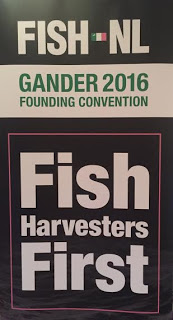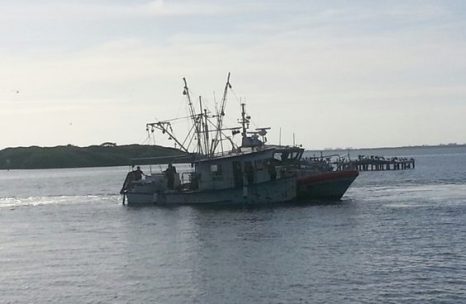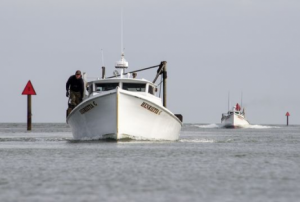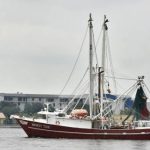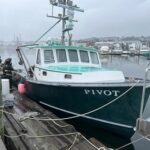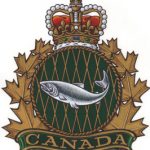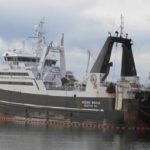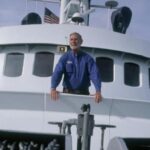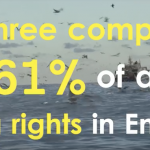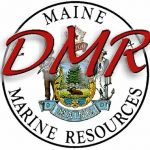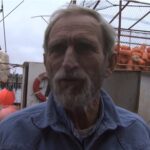Monthly Archives: October 2016
Bill Would Give Temporary Work Visas to Foreign Fishermen
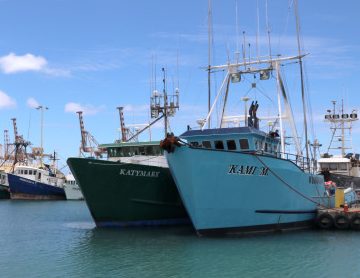 U.S. Sen. Mazie Hirono plans to introduce a bill in Congress to protect foreign fishermen from exploitation. The bill would give fishermen temporary work visas to ensure wage protections and safe working conditions. Hirono said in a statement Monday that the legislation aims to protect the fishermen while preserving the longline industry. She says the visas would allow foreign fishermen to leave their vessels while docked in Honolulu. The proposal follows an Associated Press investigation that found some fishermen have been confined to vessels for years. A federal loophole allows the foreign men to work, but it exempts them from most basic labor protections. Hirono says she’s also working with federal agencies to find solutions that don’t involve legislation. link 20:13
U.S. Sen. Mazie Hirono plans to introduce a bill in Congress to protect foreign fishermen from exploitation. The bill would give fishermen temporary work visas to ensure wage protections and safe working conditions. Hirono said in a statement Monday that the legislation aims to protect the fishermen while preserving the longline industry. She says the visas would allow foreign fishermen to leave their vessels while docked in Honolulu. The proposal follows an Associated Press investigation that found some fishermen have been confined to vessels for years. A federal loophole allows the foreign men to work, but it exempts them from most basic labor protections. Hirono says she’s also working with federal agencies to find solutions that don’t involve legislation. link 20:13
Pacific Northwest fishing industry took big hit in 2015
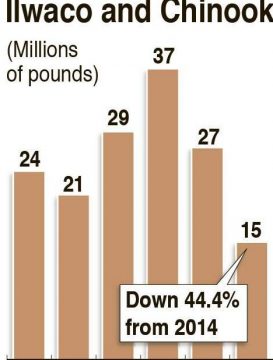 Demonstrating links between ocean health and the economy, the definitive annual federal report on U.S. fisheries released last week showed a plunge in some West Coast catches in 2015. Washington state’s total commercial catch in 2015 was 363 million pounds valued at $274.2 million, a decline of 35 percent by volume and 23.5 percent by value from 2014, according to “Fisheries of the United States 2015,” published last week by the National Marine Fisheries Service. But all was not gloom and doom: For example, West Coast landings of shrimp and albacore tuna were up, despite the warmer and less-nutritious waters associated with the ocean heat wave dubbed the Blob. This patch of warm water off the Pacific Northwest began forming in 2013 and persisted for two years before temporarily dissipating. Oregon’s commercial landings also were down, falling to about 195.5 million pounds last year, 33 percent less than in 2014. That catch was sold for $115.7 million, 26.6 percent less than 2014. How ports compare,,, Read the article here 18:07
Demonstrating links between ocean health and the economy, the definitive annual federal report on U.S. fisheries released last week showed a plunge in some West Coast catches in 2015. Washington state’s total commercial catch in 2015 was 363 million pounds valued at $274.2 million, a decline of 35 percent by volume and 23.5 percent by value from 2014, according to “Fisheries of the United States 2015,” published last week by the National Marine Fisheries Service. But all was not gloom and doom: For example, West Coast landings of shrimp and albacore tuna were up, despite the warmer and less-nutritious waters associated with the ocean heat wave dubbed the Blob. This patch of warm water off the Pacific Northwest began forming in 2013 and persisted for two years before temporarily dissipating. Oregon’s commercial landings also were down, falling to about 195.5 million pounds last year, 33 percent less than in 2014. That catch was sold for $115.7 million, 26.6 percent less than 2014. How ports compare,,, Read the article here 18:07
Keith Sullivan says FFAW will not allow 45 years of progress be torn apart by upstart FISH-NL
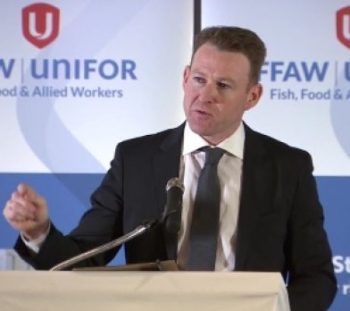 The president of Newfoundland and Labrador’s fisheries union says a breakaway group of harvesters could hurt, rather than help, their cause. Keith Sullivan of the Fish, Food and Allied Workers Union says his members are worried by an attempt to de-certify the union. “The message I am getting from the members is that we are not going to sit back and watch 45 years of progress and hard work by thousands and thousand of members be just torn apart,” Sullivan told CBC’s Central Morning Show Monday. He said the Federation of Independent Seafood Harvesters (FISH-NL), led by former journalist and member of parliament Ryan Cleary, has no real plan as to how to proceed. Sullivan acknowledges there are problems in the fishery, but the FFAW will continue to provide effective representation for its members. (and WWF!) Read the story here 16:51
The president of Newfoundland and Labrador’s fisheries union says a breakaway group of harvesters could hurt, rather than help, their cause. Keith Sullivan of the Fish, Food and Allied Workers Union says his members are worried by an attempt to de-certify the union. “The message I am getting from the members is that we are not going to sit back and watch 45 years of progress and hard work by thousands and thousand of members be just torn apart,” Sullivan told CBC’s Central Morning Show Monday. He said the Federation of Independent Seafood Harvesters (FISH-NL), led by former journalist and member of parliament Ryan Cleary, has no real plan as to how to proceed. Sullivan acknowledges there are problems in the fishery, but the FFAW will continue to provide effective representation for its members. (and WWF!) Read the story here 16:51
Operation Game Thief Reward offered for info in Hancock County lobster ‘trap war’
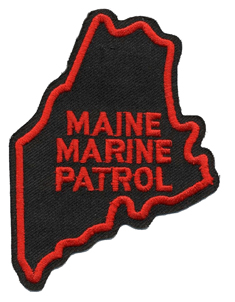 An escalating “trap war” taking place in the coastal waters of Hancock County has cost lobstermen hundreds of thousands of dollars in lost gear and is prompting state officials to authorize a reward for information. The territorial dispute, in which fishermen have cut surface buoys from each others’ traps, has been heated since early summer, according to the Maine Department of Marine Resources. The cutting has been centered on the boundary line between lobster fishing zones B and C, which runs through Blue Hill Bay from Newbury Neck in Surry to Swan’s Island. “This trap war is without a doubt the most costly loss of gear I have witnessed in my 32-year career with the Maine Marine Patrol,” Col. Jon Cornish, head of DMR’s law enforcement division, said Monday. “In this instance, [total] gear loss is estimated to far exceed $350,000 dollars.” Read the story here 16:01
An escalating “trap war” taking place in the coastal waters of Hancock County has cost lobstermen hundreds of thousands of dollars in lost gear and is prompting state officials to authorize a reward for information. The territorial dispute, in which fishermen have cut surface buoys from each others’ traps, has been heated since early summer, according to the Maine Department of Marine Resources. The cutting has been centered on the boundary line between lobster fishing zones B and C, which runs through Blue Hill Bay from Newbury Neck in Surry to Swan’s Island. “This trap war is without a doubt the most costly loss of gear I have witnessed in my 32-year career with the Maine Marine Patrol,” Col. Jon Cornish, head of DMR’s law enforcement division, said Monday. “In this instance, [total] gear loss is estimated to far exceed $350,000 dollars.” Read the story here 16:01
Santa Cruz harbor mouth dredging scheduled to begin
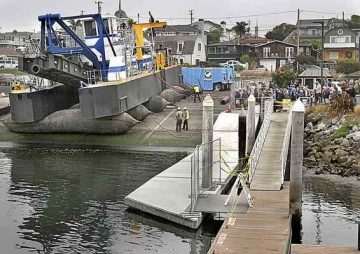 As crab season approaches, work to dredge the Santa Cruz Small Craft Harbor’s mouth is scheduled to begin Nov. 7. The new dredging season, coming after a difficult El Niño-plagued previous winter plagued by harbor mouth closures, is the maiden voyage for new harbor dredge, the Twin Lakes. Dredge builder DSC Dredge and port district’s dredging consultant CF Bean will be on hand for equipment setup, crew training and efficiency testing, Port Director Lisa Ekers said. Work has already begun elsewhere in the harbor, with crews initially focusing on north harbor dredging and installation of dredge equipment add-ons, according to Ekers. Read the rest here 13:54
As crab season approaches, work to dredge the Santa Cruz Small Craft Harbor’s mouth is scheduled to begin Nov. 7. The new dredging season, coming after a difficult El Niño-plagued previous winter plagued by harbor mouth closures, is the maiden voyage for new harbor dredge, the Twin Lakes. Dredge builder DSC Dredge and port district’s dredging consultant CF Bean will be on hand for equipment setup, crew training and efficiency testing, Port Director Lisa Ekers said. Work has already begun elsewhere in the harbor, with crews initially focusing on north harbor dredging and installation of dredge equipment add-ons, according to Ekers. Read the rest here 13:54
Scientists warn Government against recommendations to wind back marine reserves – In particular ‘no-take’ zones
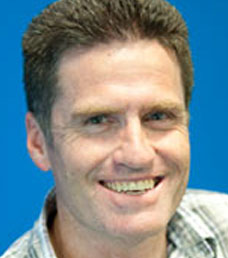 A group of scientists is urging the Government not to wind back the scale of the nation’s 40 marine reserves, contrary to the advice of an advisory panel on the matter. The panel is recommending the removal of an area almost twice the size of Tasmania from the protected zones where mining and fishing are banned. But the scientists, known as the Ocean Science Council, said cuts of that size could be devastating to marine life. Professor David Booth, a member of the council and a professor of marine ecology, said he and his colleagues had concerns over the advice given to the Government. “We welcome the review, there are a lot of good points to it, but what we’re really concerned with is these bioregional panels — which recommended the zoning of the parks in areas around Australia — fall well short of what was recommended,” he said. “In particular, the marine national park ‘no-take’ zones, which are the gold standard for looking after marine biodiversity, have been eroded.” Read the story here 12:47
A group of scientists is urging the Government not to wind back the scale of the nation’s 40 marine reserves, contrary to the advice of an advisory panel on the matter. The panel is recommending the removal of an area almost twice the size of Tasmania from the protected zones where mining and fishing are banned. But the scientists, known as the Ocean Science Council, said cuts of that size could be devastating to marine life. Professor David Booth, a member of the council and a professor of marine ecology, said he and his colleagues had concerns over the advice given to the Government. “We welcome the review, there are a lot of good points to it, but what we’re really concerned with is these bioregional panels — which recommended the zoning of the parks in areas around Australia — fall well short of what was recommended,” he said. “In particular, the marine national park ‘no-take’ zones, which are the gold standard for looking after marine biodiversity, have been eroded.” Read the story here 12:47
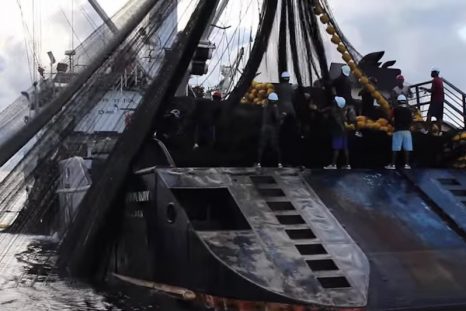
Successful PNA vessel days scheme
Five years ago managing the PNA fisheries was mostly done with a calculator and pencil, and with data sent by fax or email. Today, the fishery that is generating US$400 million a year to nine Pacific islands is managed by the Parties to the Nauru Agreement’s Fisheries Information Management System (FIMS) that allows managers to know what is taking place in their fishing zone with a tap of their computer keyboards. ‘It provides easy access to fisheries information for increasingly effective management of PNA’s Vessel Day Scheme (VDS) that governs purse seine fishing in the western and central Pacific,’ said PNA CEO Ludwig Kumoru, who added that the VDS and the FIMS management tool is also being rolled out for the longline industry. ‘FIMS shows each party’s usage of fishing days and the percentage of days left,’ said Ms. Jack. The PNA Office coordinates this fishing day data with each fishery department in the nine islands using the VDS, including resolving any differences between the national fishery department and the PNA Office in determining fishing day usage. Day-to-day VDS management of fishing day data translates directly into major revenue for each VDS participant. Between 2010 and 2015, revenue to the islands rose from US$60 million to close to US$400 million. Watch the video,Read the story here 11:07
1st Biloxi Bay oyster harvest of 21st century opens Tuesday
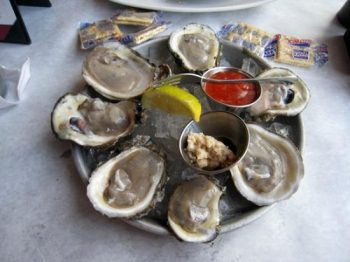 For the first time in at least 40 years, Biloxi Bay will open for oyster harvesting. The state Department of Marine Resources said in a news release reefs in the Biloxi Bay portion of the Mississippi Sound will open at sunrise Tuesday. DMR Executive Director Jamie Miller says the harvest of oysters for the first time in 40-plus years in Biloxi Bay is nothing less than historic. Miller says the opening of the oyster reefs confirms water quality has improved in the Bay. Officials say harvesting is limited to oyster tonging. No dredging will be allowed. The limit is 15 sacks per day. Artificial reefs will not be open for oyster harvesting. There will be a station in the Ocean Springs Harbor for fishermen to check in and out each day. link 10:26
For the first time in at least 40 years, Biloxi Bay will open for oyster harvesting. The state Department of Marine Resources said in a news release reefs in the Biloxi Bay portion of the Mississippi Sound will open at sunrise Tuesday. DMR Executive Director Jamie Miller says the harvest of oysters for the first time in 40-plus years in Biloxi Bay is nothing less than historic. Miller says the opening of the oyster reefs confirms water quality has improved in the Bay. Officials say harvesting is limited to oyster tonging. No dredging will be allowed. The limit is 15 sacks per day. Artificial reefs will not be open for oyster harvesting. There will be a station in the Ocean Springs Harbor for fishermen to check in and out each day. link 10:26
Unusual policy allows Massachusetts Environmental Police to interrupt shifts to work private details
 For a decade, the Massachusetts Environmental Police have operated under an unusual paid-detail policy that national law-enforcement experts warn could jeopardize officers’ commitment to public safety. The practice, known as splitting shifts, allows Environmental Police officers to interrupt their regularly scheduled duties to work a paid detail, provided that they return to work afterward and complete their required hours. It is virtually unheard of among police departments, but a similar policy was in place in New Orleans when the Department of Justice X-rayed that city’s Police Department in 2011. The federal agency found that the NOPD’s split-shift policy was a possible incentive for officers to prioritize extra money over public safety. “Just looking at it from a distance, it looks like it would complicate the ability to separate public work from private work, and that is a huge problem,” said Ed Davis, the former superintendent of the Lowell and Boston police departments. He and other law-enforcement experts questioned whether an Environmental Police officer would be as likely to make an arrest or take any police action if that action meant the officer wouldn’t be able to make it to a private paid detail on time. Read the story here 09:47
For a decade, the Massachusetts Environmental Police have operated under an unusual paid-detail policy that national law-enforcement experts warn could jeopardize officers’ commitment to public safety. The practice, known as splitting shifts, allows Environmental Police officers to interrupt their regularly scheduled duties to work a paid detail, provided that they return to work afterward and complete their required hours. It is virtually unheard of among police departments, but a similar policy was in place in New Orleans when the Department of Justice X-rayed that city’s Police Department in 2011. The federal agency found that the NOPD’s split-shift policy was a possible incentive for officers to prioritize extra money over public safety. “Just looking at it from a distance, it looks like it would complicate the ability to separate public work from private work, and that is a huge problem,” said Ed Davis, the former superintendent of the Lowell and Boston police departments. He and other law-enforcement experts questioned whether an Environmental Police officer would be as likely to make an arrest or take any police action if that action meant the officer wouldn’t be able to make it to a private paid detail on time. Read the story here 09:47
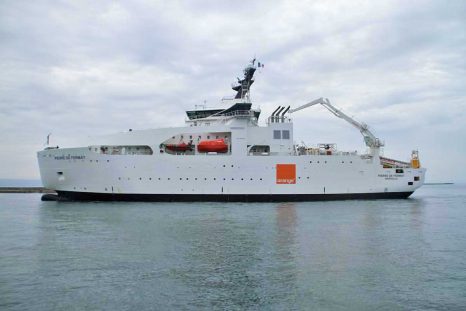
Do sharks like biting on submarine internet cables? The captain of a cable ship reveals all
That the internet is physical can be hard to grasp. Few people have experienced this fact as viscerally as Guillaume Le Saux, captain of a ship named Pierre de Fermat. It’s a state-of-the-art vessel that’s part of a fleet owned by French telecom company Orange, designed to lay and repair the optical fiber cables that criss-cross the world’s seabeds. The life of a cable-ship captain is pretty intense. Le Saux is on constant alert, ready to be dispatched to the middle of an ocean with a couple of hours’ notice. This can sometimes mean sailing into 20-foot waves, receiving ransoms, or fixing up a shark’s chew toy. When Le Saux arrives at the appointed spot at sea, he and his crew deploy Hector, the ship’s seven ton underwater robot, which will travel to the seabed, sometimes at depths of 5,000 meters. Hector’s job is to inspect the damage, bury newly laid cable on the sea-floor, or help bring damaged sections up to the ship’s jointing room, all controlled from the ship’s deck. Read the story here 17:28
Billionaire crony corporatist schemes – Financing “green” companies and enviro groups, getting richer off taxpayers and consumers
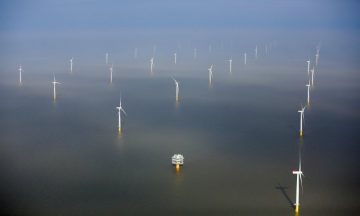 Shady cash from Vladimir Putin’s Russian energy oligarchs and other rich donors is being laundered through Bermuda-based lawyers and middlemen to “green” pressure groups, lobbyists and spinmeisters – to promote “green energy” schemes that bring billions of dollars from government agencies (and thus from us taxpayers and consumers) to a cabal of billionaires and crony companies. At the epicenter are hedge fund millionaire Nathaniel Simons, his wife Laura and their secretive Sea Change Foundation. “Investors” become even wealthier, as billions of dollars are transferred annually to environmentalists, scientists, politicians, bureaucrats and crony-corporatists in Renewable Energy & Climate Crisis, Inc. The alleged “urgency” of replacing fossil fuels with “eco-friendly renewable energy” (to prevent catastrophic manmade climate change) drives and excuses operations that define or barely skirt “corrupt practices.” The arrangements are too convoluted to explain in one article. Even the US Senate’s “Billionaires’ Club” report, Environmental Policy Alliance’s “From Russia with Love” study, and articles by investigative journalists like Ron Arnold and Lachlan Markay (here, here and here) barely scratch the surface. Washington is out of control. The IRS targeting conservative groups, Clinton Foundation and national security scandals, FBI pseudo-investigations and whitewashing, bureaucrats imposing $1.9 trillion in economy-crushing regulations that ruin families and communities – with virtually no perpetrators ever held accountable. Read the essay here 16:12
Shady cash from Vladimir Putin’s Russian energy oligarchs and other rich donors is being laundered through Bermuda-based lawyers and middlemen to “green” pressure groups, lobbyists and spinmeisters – to promote “green energy” schemes that bring billions of dollars from government agencies (and thus from us taxpayers and consumers) to a cabal of billionaires and crony companies. At the epicenter are hedge fund millionaire Nathaniel Simons, his wife Laura and their secretive Sea Change Foundation. “Investors” become even wealthier, as billions of dollars are transferred annually to environmentalists, scientists, politicians, bureaucrats and crony-corporatists in Renewable Energy & Climate Crisis, Inc. The alleged “urgency” of replacing fossil fuels with “eco-friendly renewable energy” (to prevent catastrophic manmade climate change) drives and excuses operations that define or barely skirt “corrupt practices.” The arrangements are too convoluted to explain in one article. Even the US Senate’s “Billionaires’ Club” report, Environmental Policy Alliance’s “From Russia with Love” study, and articles by investigative journalists like Ron Arnold and Lachlan Markay (here, here and here) barely scratch the surface. Washington is out of control. The IRS targeting conservative groups, Clinton Foundation and national security scandals, FBI pseudo-investigations and whitewashing, bureaucrats imposing $1.9 trillion in economy-crushing regulations that ruin families and communities – with virtually no perpetrators ever held accountable. Read the essay here 16:12
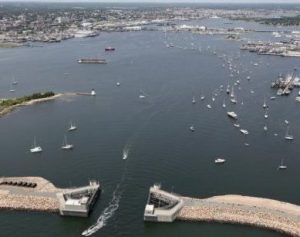
Martin Associates Study: Port of New Bedford has $9.8 billion value
The Port of New Bedford had a $9.8 billion economic value in 2015 and generates more than 36,000 jobs in the region, according to a new state-funded study that city and waterfront leaders hope will spur additional state investment in harbor dredging and other improvements. The study indicates the local port’s economic impact is comparable to that of the Port of Boston, which generated more than 50,000 jobs and had a total economic value of $4.6 billion in 2012, according to Martin Associates. The Pennsylvania-based firm also studied the Port of Boston’s economic impact in 2006, for the Massachusetts Port Authority (Massport), and has examined economic impacts of seaport activity in more than 120 U.S. and Canadian ports, from Seattle to Tampa. Martin Associates also conducted the $80,000 Port of New Bedford study, which was funded by a grant from the state’s Seaport Economic Council and included interviews and surveys with 147 companies involved in local harbor-related business. Ed Anthes-Washburn, port director for the city’s Harbor Development Commission, said much of that impact comes from the waterfront’s seafood processing industry — and called the study’s results eye-opening. Read the story here 14:01
The salt and pepper revolution

Jarvis Green: NFL Defensive End Turned Shrimp Entrepreneur
The first thing Jarvis Green wants to know, as we sit across the table from each other in the faculty cafeteria at Babson College, is which of the many nearby schools-that-start-with-the-letter-B houses my radio station. “Oh, Boston University?” He says. “I’m trying to do something with Boston University.” The next thing I know, we’re talking about Green’s plans to sell pre-cooked shrimp to college students with “value added sauce packets” so they “can’t mess it up.” And if those aren’t phrases you’d expect to hear from a former defensive end, you’re not alone. “I used to play football in the NFL. Won my two Super Bowls. I never thought I’d be doing this, you know. Learning price points. Understanding what it costs to get a shrimp out of the water.” Jarvis Green isn’t in the shrimp business because he needs the money. Sure, he could use more – he says we all could. Jarvis Green is in the shrimp business because … well, let’s start at the beginning. Read the story here 09:50

Iceland may become first nation ruled by ‘pirates’
The small island nation of Iceland may soon be the first modern country ruled by pirates. Not swashbuckling bandits with eye patches, but political pirates bent on rooting out corruption and transforming society through direct democracy. Their brand of politics is hacktivism meets revolution. Dominated by young people, the Pirates have grown from their founding in 2006 as a small Swedish movement battling restrictive copyright law into a quasi-mainstream political force. “The fisheries is a very big industry that has corruption problems,” says McCarthy on a drive through Keflavik, a city that used to be home to one of the most robust fishing industries in the country. “Tackling corruption in the fishing industry, and building a fair fisheries management system is absolutely crucial.” Quotas for cod and other fish were handed out by the government decades ago to the larger fishing companies in power, and they are now bought and rented out by large corporations for significant profit. Small fishermen can’t compete. Entire villages have had their quotas bought and moved away so there is no fishing left for the local population. Read the story here 08:11
Tuna Vessel Operator Convicted for Oil Discharges Off American Samoa
 An American tuna fishing company that regularly unloaded its catch in American Samoa, was convicted and sentenced today for discharging oil into the South Pacific and for maintaining false records, announced Assistant Attorney General John C. Cruden of the Department of Justice’s Environment and Natural Resources Division and U.S. Attorney Channing D. Phillips for the District of Columbia. The company, Pacific Breeze Fisheries LLC, owned the Fishing Vessel F/V Pacific Breeze, a tuna purse seiner that was responsible for the pollution. Pacific Breeze Fisheries admitted that its engineers failed to document the illegal dumping of oily bilge water into the waters off American Samoa without the use of required pollution prevention equipment. These discharges occurred on at least two occasions, in 2014 and 2015, before the vessel brought fish to a cannery in the port of Pago Pago, American Samoa. Read the rest here 14:11
An American tuna fishing company that regularly unloaded its catch in American Samoa, was convicted and sentenced today for discharging oil into the South Pacific and for maintaining false records, announced Assistant Attorney General John C. Cruden of the Department of Justice’s Environment and Natural Resources Division and U.S. Attorney Channing D. Phillips for the District of Columbia. The company, Pacific Breeze Fisheries LLC, owned the Fishing Vessel F/V Pacific Breeze, a tuna purse seiner that was responsible for the pollution. Pacific Breeze Fisheries admitted that its engineers failed to document the illegal dumping of oily bilge water into the waters off American Samoa without the use of required pollution prevention equipment. These discharges occurred on at least two occasions, in 2014 and 2015, before the vessel brought fish to a cannery in the port of Pago Pago, American Samoa. Read the rest here 14:11
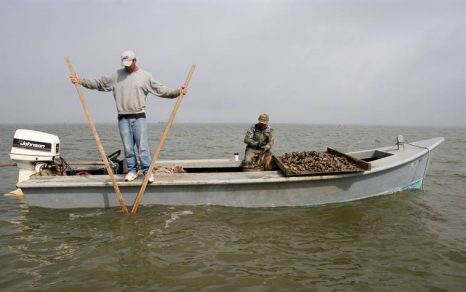
Florida-Georgia Water War to be settled in a Maine Courtroom on Monday. Last Chance for the Apalachicola Oyster?
The Flint River, from high atop the bridge on Po Biddy Road, looks nothing like the water-hogging culprit Florida makes it out to be. It’s all rocks with slivers of water barely coursing through. “That’s what paddlers call ‘bony,’ ” said Gordon Rogers, the Flint Riverkeeper. “It should be almost three times as high. And we’re not even in a big-dog drought.” Yet much of Georgia is in a drought — worsening by the day — and the lack of rain, barren streams and dwindling reservoirs buttress the latest “water war” legal battle set to begin Monday in a Maine courtroom. The stakes for Georgia have never been higher. Metro Atlanta’s future rides on the legal opinion of one irascible, no-nonsense Yankee barrister who has warned that neither Georgia nor Florida will be satisfied with his ruling. The U.S. Supreme Court appointed Ralph Lancaster as the “special master” to determine the validity of Florida’s 2013 lawsuit against Georgia and its alleged overconsumption of the Chattahoochee and Flint rivers. Whiskey’s for drinking, as the adage goes, but water’s worth fighting over. Read the story here 13:33
Consider the Lobsterman – Sam Rosen, a fisherman from Vinalhaven, Maine, discusses changes in the industry and how they affect the identity of the island community it supports.
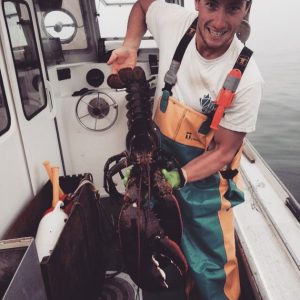 Sam Rosen is a lobster fisherman who grew up and lives on Vinalhaven, a town on an island off the coast of Maine with a year-round population of about 1,200 people. According to Vinalhaven’s chamber of commerce, roughly half of the island’s economy comes from lobster fishing and “related support activities.” For The Atlantic’s ongoing series of interviews with American workers, I spoke with Sam about starting his job at a young age and how he is faring with the obstacles currently shaping the industry. The interview that follows has been edited for length and clarity. Jeremy Venook: How did you get into lobster fishing? Sam Rosen: For most people on the island, regardless of gender, if you have a parent that runs or works on a boat, it’s likely that you’ll spend some amount of your childhood working with them. If you don’t have any interest in it you probably won’t, but most kids that age are into boats and living creatures and whatever. You get to play with fish and crash around in a boat all day. In my case, my dad had me hauling a few traps from the time I was 4 or 5 years old. Then you work your way up to more traps as you get older, and eventually get your own boat. For me, my dad built me a boat when I was 11 or 12. Read the interview here 11:40
Sam Rosen is a lobster fisherman who grew up and lives on Vinalhaven, a town on an island off the coast of Maine with a year-round population of about 1,200 people. According to Vinalhaven’s chamber of commerce, roughly half of the island’s economy comes from lobster fishing and “related support activities.” For The Atlantic’s ongoing series of interviews with American workers, I spoke with Sam about starting his job at a young age and how he is faring with the obstacles currently shaping the industry. The interview that follows has been edited for length and clarity. Jeremy Venook: How did you get into lobster fishing? Sam Rosen: For most people on the island, regardless of gender, if you have a parent that runs or works on a boat, it’s likely that you’ll spend some amount of your childhood working with them. If you don’t have any interest in it you probably won’t, but most kids that age are into boats and living creatures and whatever. You get to play with fish and crash around in a boat all day. In my case, my dad had me hauling a few traps from the time I was 4 or 5 years old. Then you work your way up to more traps as you get older, and eventually get your own boat. For me, my dad built me a boat when I was 11 or 12. Read the interview here 11:40
Monroe County Sheriff’s Office Marine deputy gets down and dirty to find resource violators
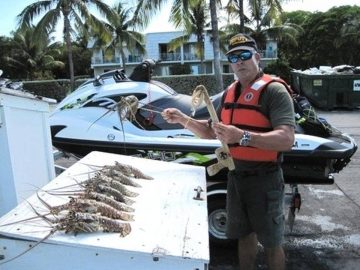 Willy Guerra keeps a dry uniform ready at home because his clothes are often wet from jumping into Florida Keys waters to catch criminals. Guerra, the chief Monroe County Sheriff’s Office marine deputy who is based in Marathon, is no stranger to hiding out and waiting to catch those who would deplete the Keys’ natural resources — fish and lobster in particular. Since he became a marine deputy in 2005, Guerra’s hidden in a garbage can, on top of a sewer treatment plant and in mangroves, staking out criminal activity at all hours of the day and night. Tuesday, the Marathon City Council commended Guerra with a plaque for his efforts. One particular case from 2015 involving a man from Miami who was prosecuted for stealing lobster in Marathon was highlighted. Bill Kelly, executive director the Florida Keys Commercial Fishermen’s Association, said George Vargas worked for at least three years in Marathon poaching lobster. In one night, Guerra caught Vargas with 267 wrung lobster tails of all sizes. They weighed out at 225 pounds with a commercial value of $4,205. “He made $723,000 in a year if he worked all year and we know he did that for at least three years, so we’re talking $2.16 million he absconded with from the men and women in the commercial fishing industry,” Kelly said. Read the story here 09:51
Willy Guerra keeps a dry uniform ready at home because his clothes are often wet from jumping into Florida Keys waters to catch criminals. Guerra, the chief Monroe County Sheriff’s Office marine deputy who is based in Marathon, is no stranger to hiding out and waiting to catch those who would deplete the Keys’ natural resources — fish and lobster in particular. Since he became a marine deputy in 2005, Guerra’s hidden in a garbage can, on top of a sewer treatment plant and in mangroves, staking out criminal activity at all hours of the day and night. Tuesday, the Marathon City Council commended Guerra with a plaque for his efforts. One particular case from 2015 involving a man from Miami who was prosecuted for stealing lobster in Marathon was highlighted. Bill Kelly, executive director the Florida Keys Commercial Fishermen’s Association, said George Vargas worked for at least three years in Marathon poaching lobster. In one night, Guerra caught Vargas with 267 wrung lobster tails of all sizes. They weighed out at 225 pounds with a commercial value of $4,205. “He made $723,000 in a year if he worked all year and we know he did that for at least three years, so we’re talking $2.16 million he absconded with from the men and women in the commercial fishing industry,” Kelly said. Read the story here 09:51
South Atlantic Region Offshore oil surveys to start as seismic testing opposition grows
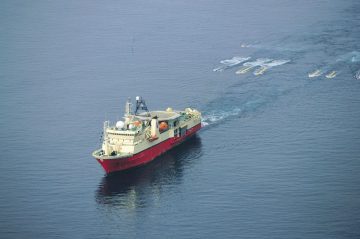 Nearly a half million commercial fishing families have joined the opposition to seismic testing for oil and natural gas in the Atlantic Ocean, according to a South Carolina-based business chamber. Meanwhile, a first, non-seismic survey is set to start. The families, numbering more than 400,000, are part of a coastal residents and business movement that has coalesced into the tens of thousands in South Carolina alone. More than 100 Atlantic coastal communities, thousands of businesses and more than 1,000 elected officials also have called on President Barack Obama to stop the testing, according to South Carolina Small Business Chamber of Commerce and Oceana, an environmental advocate. Meanwhile the federal Bureau of Ocean Energy Management continues to process permit applications from seven probe applicants, including six that want to search in waters off South Carolina. “BOEM is currently in the process of reviewing those permits. Before the permits can be issued, careful environmental analysis is done to ensure the safety of the marine ecosystem,” spokeswoman Caryl Fagot said. Read the story here 09:26
Nearly a half million commercial fishing families have joined the opposition to seismic testing for oil and natural gas in the Atlantic Ocean, according to a South Carolina-based business chamber. Meanwhile, a first, non-seismic survey is set to start. The families, numbering more than 400,000, are part of a coastal residents and business movement that has coalesced into the tens of thousands in South Carolina alone. More than 100 Atlantic coastal communities, thousands of businesses and more than 1,000 elected officials also have called on President Barack Obama to stop the testing, according to South Carolina Small Business Chamber of Commerce and Oceana, an environmental advocate. Meanwhile the federal Bureau of Ocean Energy Management continues to process permit applications from seven probe applicants, including six that want to search in waters off South Carolina. “BOEM is currently in the process of reviewing those permits. Before the permits can be issued, careful environmental analysis is done to ensure the safety of the marine ecosystem,” spokeswoman Caryl Fagot said. Read the story here 09:26
Alert over salmon deaths crisis on Scots fish farms caused by infectious disease
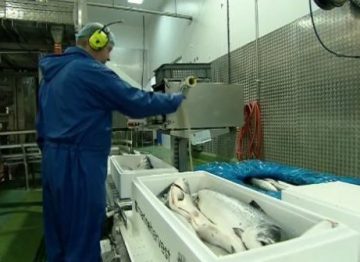 Conservationists have called for government action after raising concerns that hundreds of thousands of fish have died from an infectious disease in salmon farms in Hebrides and Wester Ross. The Salmon and Trout Conservation Scotland has called on Scottish ministers to intervene to protect wild fish after an outbreak of Amoebic Gill Disease (AGD). It is understood that four farm sites have been affected including West Loch Tarbert and East Loch Tarbert on Harris, Loch Greshornish on Skye and the Isle of Ewe in Wester Ross. Marine Harvest salmon farms have been particularly affected, it is said. The news comes just two weeks after Prince Charles visited the Marine Harvest salmon farm in Kinlochleven the Highlands to observe work on its “cleaner fish” project. Salmon and Trout Conservation Scotland said that up to 25 per cent of the stock at the afflicted sites are understood to have been lost, with dead fish transported to Wigan in Greater Manchester for incineration. Read the story here 08:53
Conservationists have called for government action after raising concerns that hundreds of thousands of fish have died from an infectious disease in salmon farms in Hebrides and Wester Ross. The Salmon and Trout Conservation Scotland has called on Scottish ministers to intervene to protect wild fish after an outbreak of Amoebic Gill Disease (AGD). It is understood that four farm sites have been affected including West Loch Tarbert and East Loch Tarbert on Harris, Loch Greshornish on Skye and the Isle of Ewe in Wester Ross. Marine Harvest salmon farms have been particularly affected, it is said. The news comes just two weeks after Prince Charles visited the Marine Harvest salmon farm in Kinlochleven the Highlands to observe work on its “cleaner fish” project. Salmon and Trout Conservation Scotland said that up to 25 per cent of the stock at the afflicted sites are understood to have been lost, with dead fish transported to Wigan in Greater Manchester for incineration. Read the story here 08:53
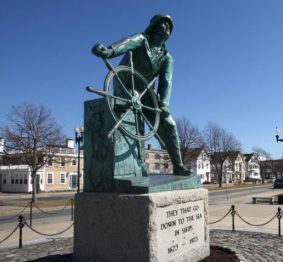
25 years ago, the crew of the Andrea Gail was lost in the ‘perfect storm’
At the heart of Gloucester, America’s oldest seaport, visitors will find an eight-foot-tall bronze fisherman at the wheel of his ship. Engraved at the base of the Gloucester Fisherman’s Memorial are the names of more than 3,000 residents who were lost at sea and the following words: “They that go down to the sea in ships, 1623-1923.” Twenty-five years ago, one ship in particular gained national fame when it was lost during the “perfect storm” of 1991. The “storm with no name” claimed the lives of six fishermen and the captain and crew of the Andrea Gail, a disaster that was later chronicled in Sebastian Junger’s bestselling book and a film starring George Clooney. The storm left a trail of destruction from Nova Scotia to Florida, killing 13 people and causing close to $500 million in damage as it lashed the coast from Oct. 26 through Nov. 1 of that year. Read the story here 08:12
New Bedford again tops nation for dollar value of fishing catch
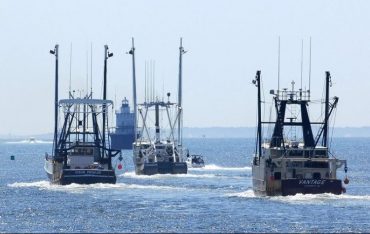 The city’s port has again topped the country for dollar value of its fishing catch, NMFS reported this week, citing 2015 landings worth $322 million. That marks 16 years in a row that New Bedford has held the top-value title, which is thanks largely to scallops. Dutch Harbor, Alaska, again was tops for total volume of catch, landing 787 million pounds last year. “The scallop industry has put New Bedford at the top of the food chain, as it were, of fishing ports for the last 16 years — that’s a very impressive streak,” said Ed Anthes-Washburn, port director for the city’s Harbor Development Commission. “It really shows the impact of scallops but also the impact of cooperative research.” In the 1990s, SMAST scientists Brian Rothschild and Kevin Stokesbury pioneered innovations in counting scallops, with cameras tested and used on local scallopers. The resulting data affected stock assessments by the National Oceanic and Atmospheric Administration (NOAA), ultimately leading to larger catch quotas and helping secure steady catches for waterfront businesses. Read the rest here 19:52
The city’s port has again topped the country for dollar value of its fishing catch, NMFS reported this week, citing 2015 landings worth $322 million. That marks 16 years in a row that New Bedford has held the top-value title, which is thanks largely to scallops. Dutch Harbor, Alaska, again was tops for total volume of catch, landing 787 million pounds last year. “The scallop industry has put New Bedford at the top of the food chain, as it were, of fishing ports for the last 16 years — that’s a very impressive streak,” said Ed Anthes-Washburn, port director for the city’s Harbor Development Commission. “It really shows the impact of scallops but also the impact of cooperative research.” In the 1990s, SMAST scientists Brian Rothschild and Kevin Stokesbury pioneered innovations in counting scallops, with cameras tested and used on local scallopers. The resulting data affected stock assessments by the National Oceanic and Atmospheric Administration (NOAA), ultimately leading to larger catch quotas and helping secure steady catches for waterfront businesses. Read the rest here 19:52
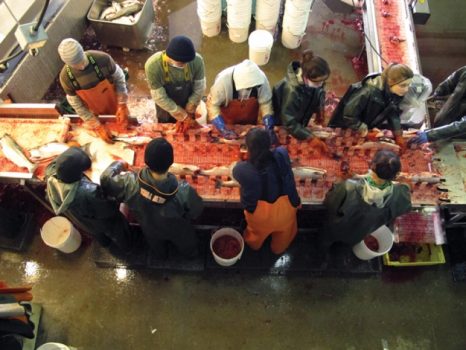
Processors working with harvesters on budget plan
Fish harvesters and processors might not agree on much, but everyone hates taxes. Commercial fishing stakeholders took turns in 2016 tearing apart a commercial fisheries tax plan from Gov. Bill Walker that the Legislature batted around during the marathon session but eventually dropped. The industry has such diverse needs and complex features that the bill couldn’t hit the revenue target without hurting one industry segment more than another. Stakeholders also objected to a holdup with a range of other industry taxes introduced by Walker. As none of the other taxes moved out of committee, House Fisheries Committee Chair Rep. Louise Stutes, R-Kodiak, tabled the fishing taxes until she could be sure the industry wouldn’t take a hit none of the other industry’s would face. Months later, Walker bundled the fisheries tax into a bill with mining and fuel taxes. The bill stalled. Fisheries stakeholders might have a fix. At an October meeting of the United Fishermen of Alaska, the state’s largest harvester group, fishermen decided to knock heads together instead of against the legislative wall. Read the story here 17:44
Ross Sea marine park announced, but concerns linger over expiry date
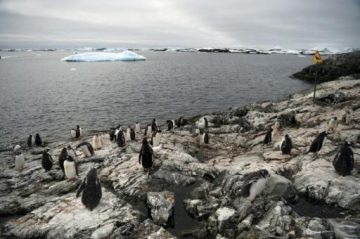 The world’s largest marine protected area will be created in Antarctica’s waters in an global agreement made in Hobart. “It has been clearly established that fully protecting large parts of the ocean is critical to mitigating the effects of climate change”, he said. Ukraine, China and Russian Federation had expressed concerns in the past, with Russian Federation becoming the final holdout before the deal was made. “The Ross Sea Region [Marine Protected Area] will safeguard one of the last unspoiled ocean wilderness areas on the planet ― home to unparalleled marine biodiversity and thriving communities of penguins, seals, whales, seabirds, and fish”, U.S. Secretary of State John Kerry said in a statement. “Seventy-two percent of the MPA will be a “no-take” zone, which forbids all fishing, while other sections will permit some harvesting of fish and krill for scientific research”, the commission explained. There will be a blanket ban on commercial fishing across about three-quarters of that area. Read the rest here 16:28
The world’s largest marine protected area will be created in Antarctica’s waters in an global agreement made in Hobart. “It has been clearly established that fully protecting large parts of the ocean is critical to mitigating the effects of climate change”, he said. Ukraine, China and Russian Federation had expressed concerns in the past, with Russian Federation becoming the final holdout before the deal was made. “The Ross Sea Region [Marine Protected Area] will safeguard one of the last unspoiled ocean wilderness areas on the planet ― home to unparalleled marine biodiversity and thriving communities of penguins, seals, whales, seabirds, and fish”, U.S. Secretary of State John Kerry said in a statement. “Seventy-two percent of the MPA will be a “no-take” zone, which forbids all fishing, while other sections will permit some harvesting of fish and krill for scientific research”, the commission explained. There will be a blanket ban on commercial fishing across about three-quarters of that area. Read the rest here 16:28
Coast Guard conducts multiple rescues off Ocean City, Maryland
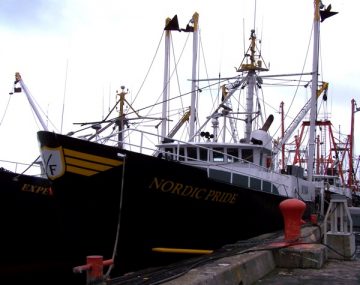 Coast Guard crews rescued two boaters in two separate cases off Ocean City Thursday afternoon. At approximately 12:30 p.m., watchstanders at Coast Guard Sector Maryland-National Capital Region received notification from the 90-foot vessel Instigator of a 64-year-old male suffering from a possible heart attack. A Coast Guard Air Station Elizabeth City, N.C., MH-60 aircrew was diverted from training to rendezvous with the vessel almost 45 miles off Ocean City. At approximately 1:30 p.m., the aircrew hoisted the man from the vessel and brought him to Peninsula Regional Hospital in Salisbury in stable condition. Sector Maryland-NCR watchstanders received a second radio call at 12:40 p.m., from the fishing vessel Nordic Pride of a passenger experiencing pain near his kidneys since 2 a.m. A rescue boatcrew from Coast Guard Station Ocean City, with Ocean City EMS aboard, was launched. At 2:24 p.m., the boatcrew arrived at the vessel’s location 17 miles off Ocean City. The boater was brought aboard and taken back to the Coast Guard station and transferred to awaiting EMS in stable condition. link 11:41
Coast Guard crews rescued two boaters in two separate cases off Ocean City Thursday afternoon. At approximately 12:30 p.m., watchstanders at Coast Guard Sector Maryland-National Capital Region received notification from the 90-foot vessel Instigator of a 64-year-old male suffering from a possible heart attack. A Coast Guard Air Station Elizabeth City, N.C., MH-60 aircrew was diverted from training to rendezvous with the vessel almost 45 miles off Ocean City. At approximately 1:30 p.m., the aircrew hoisted the man from the vessel and brought him to Peninsula Regional Hospital in Salisbury in stable condition. Sector Maryland-NCR watchstanders received a second radio call at 12:40 p.m., from the fishing vessel Nordic Pride of a passenger experiencing pain near his kidneys since 2 a.m. A rescue boatcrew from Coast Guard Station Ocean City, with Ocean City EMS aboard, was launched. At 2:24 p.m., the boatcrew arrived at the vessel’s location 17 miles off Ocean City. The boater was brought aboard and taken back to the Coast Guard station and transferred to awaiting EMS in stable condition. link 11:41
Marine protection for Bay of Fundy pushed by baykeeper
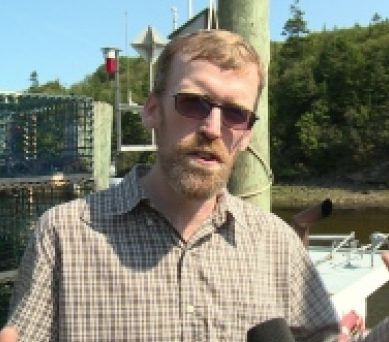 The New Brunswick Conservation Council’s Fundy baykeeper wants to see Ottawa move ahead with plans to designate much of the Bay of Fundy as a marine protected area. Matthew Abbott attended an open house held by the Department of Fisheries and Oceans in St. George on Wednesday and said there were many “lively discussions” about the future of the bay. Sixteen areas which are considered to be ecologically sensitive have been identified by DFO. “There’s quite a cluster of [habitats] in southwest New Brunswick around Grand Manan, Deer Island, Campobello Island and right in … to Passamaquoddy Bay,” Abbott said. “Marine protected areas can be relatively smaller sites spread around or it could be a larger site that has zones. Some places for fishing — maybe a small area where there isn’t fishing.” Read the rest here 10:54
The New Brunswick Conservation Council’s Fundy baykeeper wants to see Ottawa move ahead with plans to designate much of the Bay of Fundy as a marine protected area. Matthew Abbott attended an open house held by the Department of Fisheries and Oceans in St. George on Wednesday and said there were many “lively discussions” about the future of the bay. Sixteen areas which are considered to be ecologically sensitive have been identified by DFO. “There’s quite a cluster of [habitats] in southwest New Brunswick around Grand Manan, Deer Island, Campobello Island and right in … to Passamaquoddy Bay,” Abbott said. “Marine protected areas can be relatively smaller sites spread around or it could be a larger site that has zones. Some places for fishing — maybe a small area where there isn’t fishing.” Read the rest here 10:54
Mackerel fishery closed unexpectedly, leaving some P.E.I. fishermen without enough bait
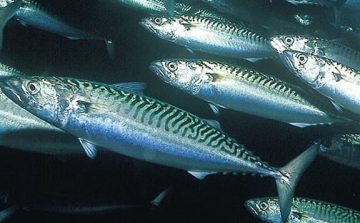 Atlantic Canada’s commercial inshore mackerel fishery closed early for the first time in the fishery’s history, and some Island fishermen don’t have enough bait. The chair responsible for mackerel with the P.E.I. Fishermen’s Association, Chuck White, was shocked when he got the news. “Wow, it’s never been closed before,” said White. He said it’s leaving some fishermen in a tight spot. At least half the fishermen he has spoken with in Eastern P.E.I. don’t have enough bait for next year’s lobster season. “There’s some guys saying they still need some bait, and if the fishery’s closed, not to be reopened, then they’re going to be looking at buying it come spring.” White said it’s much cheaper for fishermen to fish the bait themselves and freeze it over the winter, something many of them do in November. More than 1,200 P.E.I. fishermen catch mackerel commercially. Read the story here 09:24
Atlantic Canada’s commercial inshore mackerel fishery closed early for the first time in the fishery’s history, and some Island fishermen don’t have enough bait. The chair responsible for mackerel with the P.E.I. Fishermen’s Association, Chuck White, was shocked when he got the news. “Wow, it’s never been closed before,” said White. He said it’s leaving some fishermen in a tight spot. At least half the fishermen he has spoken with in Eastern P.E.I. don’t have enough bait for next year’s lobster season. “There’s some guys saying they still need some bait, and if the fishery’s closed, not to be reopened, then they’re going to be looking at buying it come spring.” White said it’s much cheaper for fishermen to fish the bait themselves and freeze it over the winter, something many of them do in November. More than 1,200 P.E.I. fishermen catch mackerel commercially. Read the story here 09:24
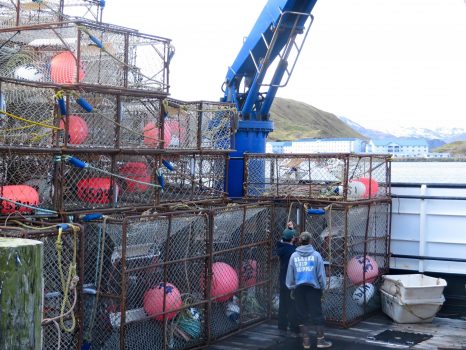
Bristol Bay Red King Crab Fishery Starts Strong Despite Low Stock Assessment
The red king crab fishery is off to a booming start in Bristol Bay, despite predictions of a down season. The fleet has caught two-thirds of its quota in just a dozen days, and managers say fishermen are unloading big, beautiful crab at the dock. Gordon Christiansen is a commercial fisherman with more than 40 years of experience in Bering Sea. This season, he said the crab were especially voracious eaters, quick to fill the pots dropped by his crew on the F/V Aleutian Mariner. “From the time we set pots in the water, we were done in 60 hours,” said Christiansen. “It was amazing, tremendous fishing. We’d like to go out again and do it again tomorrow.” Having already harvested their 120,000-pound allocation, his seven-vessel fleet is finished for the season. The average crab from their haul weighed just over seven pounds — a half-pound larger than normal, according to Christiansen. Read the story here 09:07






